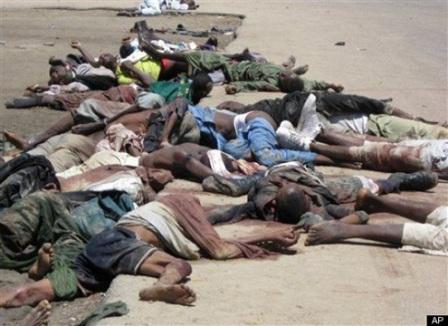A week ago, Nigerians awoke to the news that the town of Baga on the shores of Lake Chad in Borno State had been the scene of a bloody battle between the Multinational Task Force, which comprises of soldiers from Nigeria, Chad and Cameroun, and members of the Boko Haram Islamist sect. By the end of the battle, a large part of the town lay burnt and in ruins and an estimated 187 people were dead. A large part of that number is said to have included civilians killed by the soldiers.
A lot of facts about the battle are debatable: from the number of victims which have gone from 30 militants, six civilians and one soldier from the Defence Headquarters to 187 persons by the Red Cross and large sections of the media, to even 228 by Senator Maina Ma’aji Lawan representing Borno North Senatorial District in the Senate, who happens to come from Baga. There are also debates as to whether these victims were killed entirely by the MTF or by fires set off by rocket-propelled grenades fired by the militants.
However, a few things are not in contention, chief among which is that the Nigerian military still remains a brutal force, that while it has been largely efficient at quelling rebels in other African countries, is yet to learn how to fight rebels in civilian communities without so much collateral damage.
This is not the first time that the military has been accused of such a crime. In our earliest memories, we remember Odi in Bayelsa State, Zaki-Biam in Benue State and Gbaramatu in Delta State. In all cases, the military failed to carefully isolate militants from innocent people, and in one fell swoop, levelled the towns. It ended up doing way more damage than good.
It is very important that the military learnt the rules of engagement and use tact and professionalism in fighting the insurgents. Anything less would end up alienating the people and make an already tough job even tougher, as the people would be more reluctant to help the military.
Another issue is that of the uncooperativeness of the people of towns in which militants hide to expose and report them to authorities. In such situations, it lends weight to the allegation that the people of the town are tacit supporters. I understand that exposing terrorists is a risk, but it is much better than having them live in the community and becoming troublemakers. As much as possible, communities should devise ways to inform authorities of suspicious activities of people among them.
One disappointing fallout of the Baga massacre is the attempt by different sections of the country to make it a religious or ethnic issue. I have read several articles where the writers allege a conspiracy to annihilate Muslims, or Northerners or Northern Muslims. This is one fact I disagree with vehemently.
Like I earlier pointed out, the atrocities of the military has cut across Nigeria, from the South-South to the North-East. An attempt to cast it in religious and ethnic terms risks polarizing the country even further, buying the militants undeserved support.
Also, it is hypocrisy if people protest only when an incident affects someone of their ethnicity or religious faith. As Nigerians, whatever happens in any part is felt directly or indirectly in each and every part. We should not wait until it touches one of ours before we protest. Injustice anywhere is injustice everywhere.
Lastly, this might end up complicating further the amnesty programme of the government which has already started on a weak footing with the withdrawal of two members of the committee set up to draw up modalities for it.
There have been too many Nigerian lives lost already. Everything that can be done to avoid more lives being lost should be done.



Leave a Reply